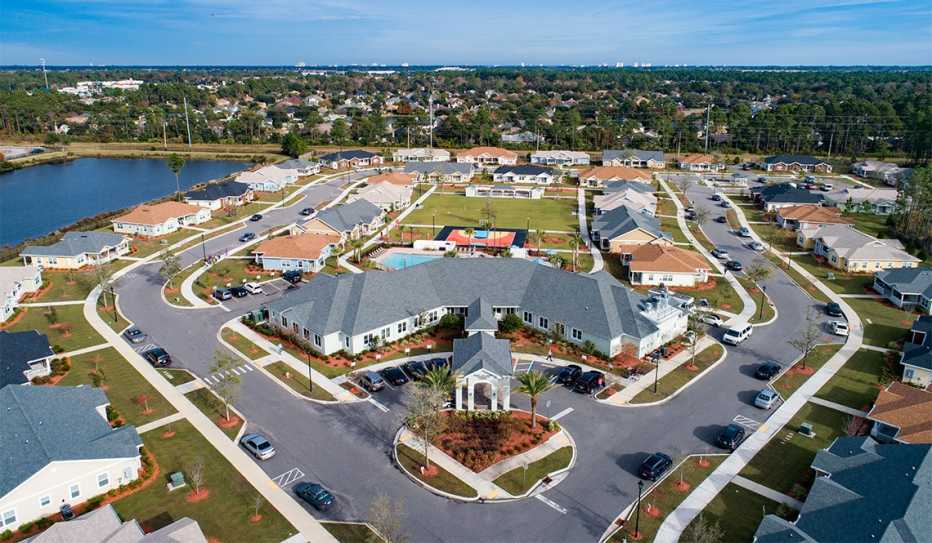AARP Hearing Center


In 2016, The Arc Jacksonville* opened the Village, the nation’s first affordable apartment community for people with I/DD. The community was many years in the making. The ability of others to create similar developments elsewhere will vary.
“Each state is different as far as the availability of tax credit dollars or grants,” says Jim Whittaker, president and CEO of The Arc Jacksonville. “You have to look at what's available in that locale to determine what road to take.”
Whittaker has deep roots advocating for people with I/DD. “My mom was a teacher in a state institution in Miami some 50 years ago,” he explains. “She would bring home kids from the institution who didn’t have family and we always welcomed them into our home.”
Whittaker later earned a degree in special education and a master’s in administration. He has been with The Arc since 1975, starting with The Arc of Putnam County, also in Florida. Whittaker is retiring at the end of 2021 but will continue helping to create communities like the Village.
Following is his advice about advocating for I/DD-friendly housing:
- Partner Up: “Families need to partner with an experienced, local not-for-profit that shares their vision, because what most families don’t have is organizational experience. In fact, Florida Housing Finance Corporation has made it a requirement that when applicants get funded they have to find a partner organization to provide the needed services. For The Arc Jacksonville, we’d been in business for 60 years, so we had the experience. Some others that have been funded do not have experience, and their communities have encountered growing pains.”
- Aim High: “When I talk to groups, I tell them that building a Village is one thing, operating it is another. You need to make sure the way it operates is going to be of high-quality, as you're creating a lifestyle and community. It won’t be a place where people just lay down their head.”
- Location, Location, Location: “Make sure the Village is accessible to public transportation, grocery shopping, restaurants, entertainment and that it's located in a safe part of the city, town or neighborhood. Land is less expensive in less desirable areas, but you don't want to build there.”
- Speak Up! Don’t Give Up: “Parents need to be actively engaged and not take no for an answer. Bureaucrats tend to say, ‘No, we can't do that.’ Sometimes things need to be changed, legislatively or strategically. So, it's a process. It doesn't happen overnight. But that's why legislators are key to so much of the needed funding and policy. Families need to sit at the table and express what they want for their kids. I'm a professional. I deal with legislators all the time. But if I take a family member with me, legislators react differently. This is Mom telling her story. It's not Jim just saying, ‘We need to do this.’”
Amy Lennard Goehner is the parent of an adult son with autism. He lives in a residential community in upstate New York. Learn more by reading "Finding a 'Forever Home' for My Adult Son With Autism."
* The inclusion of The Arc of Jacksonville in the article “How to Create a Residential Community for Adults With I/DD” is not an endorsement by AARP.
One Size Doesn’t Fit All
A housing debate exists in and about the disability community, with the preference and policy pendulum regularly swinging between the benefits of large, structured settings and those of small, informal, community-based options.
“There are good and bad places, large and small, and people with disabilities are not all the same,” political strategist David Axelrod, the parent of an adult daughter with disabilities, wrote in the New York Times in July 2021. "Like anyone else, they have different personalities, capacities and preferences." Some, Axelrod notes, thrive in small homes or apartments in residential neighborhoods, while others prefer a dormlike setting and the stimulation of campus life.
"Instead of judging by size," he writes, "isn’t the right path to fully fund an array of high-quality options and afford people … the dignity of choice and the happiness they deserve?”
Page published November 2021































.jpg?crop=true&anchor=13,195&q=80&color=ffffffff&u=lywnjt&w=2008&h=1154)





























